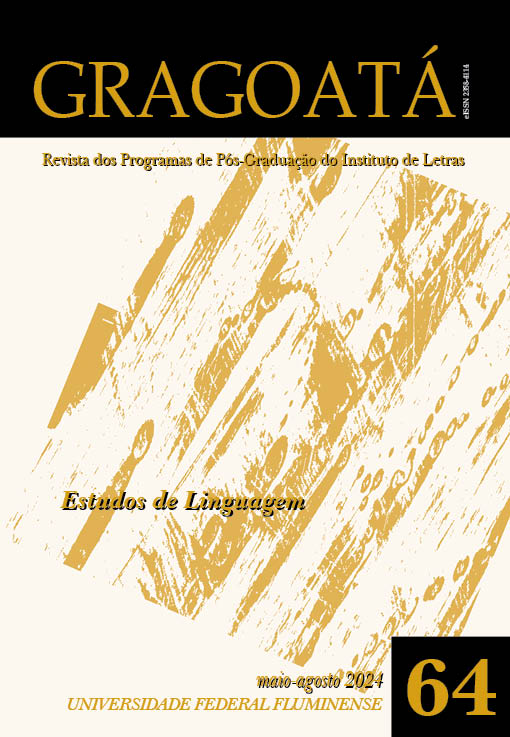'Se pá' um condicional epistêmico!
DOI:
https://doi.org/10.22409/gragoata.v29i64.60585.ptPalavras-chave:
expressão idiomática, composicionalidade, condicional indicativo, expressividadeResumo
Este artigo tem como objetivo apresentar uma proposta para a semântica-pragmática da expressão ‘se pá’, característica da fala de comunidades mais jovens no Brasil. Em textos escritos, como whatsapp ou twitter, aparece grafada de maneiras distintas: ‘cepá', 'sepá', 'cpá' e etc.... Argumentamos que se trata de uma expressão composicional, em que o ‘se’ é a conjunção condicional e o ‘pá’ ocupa o lugar da sentença antecedente. Defendemos inicialmente que não estamos diante de um operador de possibilidade como ‘talvez’, mas de um condicional indicativo, já que não se combina com formas do verbo no subjuntivo. Mostramos, com base em Potts (2007), que o ‘pá’ carrega expressividade, veiculando a posição subjetiva do falante. Para a semântica, partimos da proposta de Kratzer (2012) para os condicionais em que o ‘se’ indica que a restrição da quantificação universal, que é implícita, é dada pelo antecedente. O antecedente está ocupado por ‘pá’, que veicula que as restrições são aquilo que é o curso normal dos eventos. A base modal são os mundos acessíveis a partir do mundo de avaliação, que são ordenados segundo a normalidade. O ‘pá’ é a proposição que resume as condições normais. Assim, o falante indica que se tudo for normal, o consequente se segue. Logo, ele não apenas está inclinado na direção do consequente, mas a expressividade da expressão veicula que o falante está emocionalmente inclinado nessa direção.
Downloads
Referências
BENNETT, Jonathan. A philosophical guide to conditionals. Oxford: Oxford
University Press, 2003.
BUARQUE, Chico. Tanto mar. São Paulo: PHILIPS. Faixa 10. 1 CD. 1978
FALERO, José. Os supridores. São Paulo: Todavia, 2020.
von FINTEL, Kai. Modality and Language. In: BORCHERT, Donald M.
(ed.). Encyclopedia of Philosophy. Detroit: MacMillan Reference, 2006. p.
-27.
von FINTEL, Kai. Conditionals. In: PORTNER, Paul; von HEUSINGER,
Klaus; MAIENBORN, Claudia (ed.). Semantics - Noun Phrases and Verb
Phrases. Berlin, Boston: De Gruyter Mouton, 2019. p. 503-530.
GILLIES, Anthony. Epistemic Conditionals and Conditional Epistemics.
NOÛS, v. 38, n. 4, p. 585-616, 2004.
GRICE, Herbert Paul. Studies in the way of words. Cambridge: Harvard
University Press, 1989.
KRATZER, Angelika. Conditionals. Chicago Linguistics Society, v. 22, n.
, p. 1-15, 1986.
KRATZER, Angelika. Modals and conditionals. Oxford: Oxford University
Press, 2012.
LEWIS, David. Adverbs of quantification. In: KEENAN, Edward (ed.).
Semantics of Natural Language. Cambridge: Cambridge University Press,
p. 3-15.
LEWIS, David. On the plurality of worlds. Oxford: Blackwell, 1986.
MARQUES, Rui; PIRES DE OLIVEIRA, Roberta. Mood and Modality.
WETZELZ, Leo Willem; MENUZZI, Sérgio; COSTA, João (ed.). Handbook
of Portuguese Linguistics. Wiley Blackwell, 2016. p. 408- 24.
VEIGH. Meio Pa. Jaraguá do Sul: Supernova Entertainment. 2022.
Disponível em: https://www.youtube.com/watch?v=AtolYzaMoXc.
Acesso 15 nov 2023.
MC DAVI. Pé Direito. São Paulo: Pereira DJ, 2016. Disponível em: https://
www.youtube.com/watch?v=5Xc9SQrfJog. Acesso 15 nov 2023.
PIRES DE OLIVEIRA, Roberta; MORTÁRI, Cezar Augusto. Modais:
semântica e lógica. (no prelo)
POTTS, Christopher. The Expressive Dimension. Theoretical Linguistics,
v. 33, p. 165-197, 2007.
POTTS, Christopher. Conventional implicature and expressive content.
In: MAIENBORN, Claudia; von HEUSINGER, Klaus; PORTNER, Paul
(ed.). Semantics - Interfaces. Berlin, Boston: De Gruyter Mouton, 2019. p.
-621.
RACIONAIS MC’s. Vida Loka pt1. São Paulo, Casa Nostra, 1994.
ROBERTS, Craige. Information structure: Towards an integrated formal
theory of pragmatics. In: YOON, Jae-Hak; KATHOL, Andreas. (ed.). Papers
in Semantics. Working papers in Linguistics 49. Ohio: Ohio State University,
p. 91-136.
RULLMANN, Hotze, MATTHEWSON, Lisa, DAVIS, Henri. Modals as
distributive indefinites. Natural Language Semantics v. 16, p. 317-57, 2008.
Downloads
Publicado
Edição
Seção
Licença
Copyright (c) 2024 Gragoatá

Este trabalho está licenciado sob uma licença Creative Commons Attribution 4.0 International License.
AUTORIZAÇÃO
Autores que publicam em Gragoatá concordam com os seguintes termos:
Os autores mantêm os direitos e cedem à revista o direito à primeira publicação, simultaneamente submetido a uma licença Creative Commons Atribuição 4.0 Internacional (CC BY 4.0), que permite o compartilhamento por terceiros com a devida menção ao autor e à primeira publicação pela Gragoatá.
Os autores podem entrar em acordos contratuais adicionais e separados para a distribuição não exclusiva da versão publicada da obra (por exemplo, postá-la em um repositório institucional ou publicá-la em um livro), com o reconhecimento de sua publicação inicial na Gragoatá.
A Gragoatá utiliza uma Licença Creative Commons - Atribuição CC BY 4.0 Internacional.











